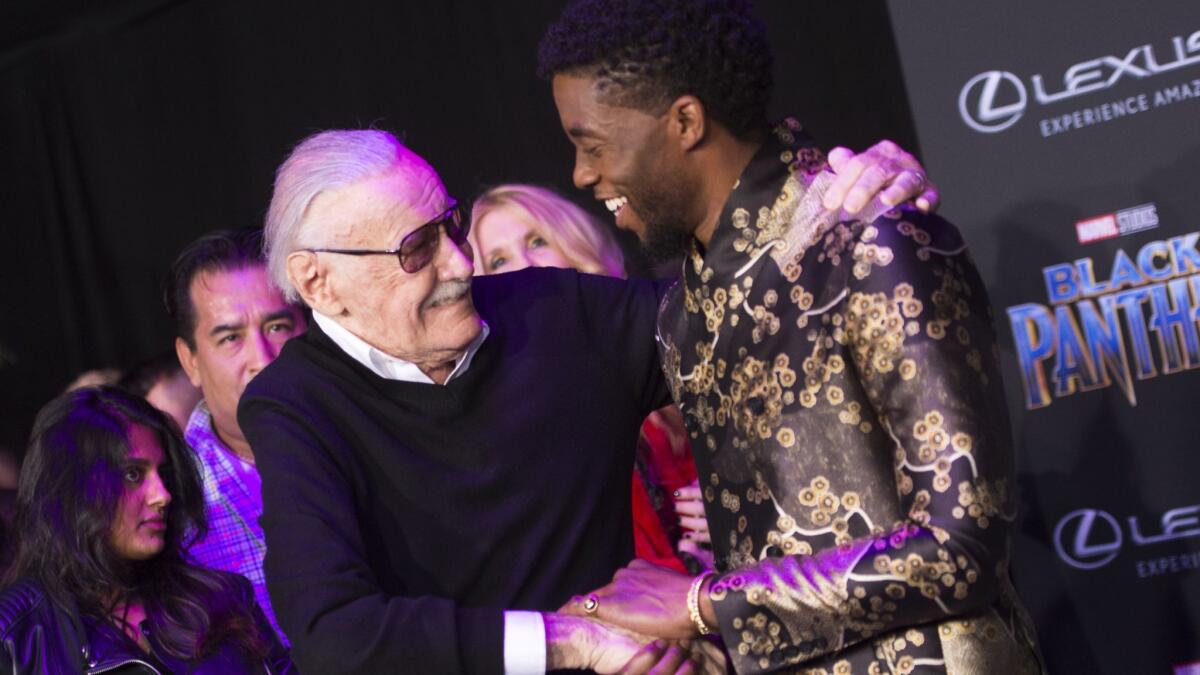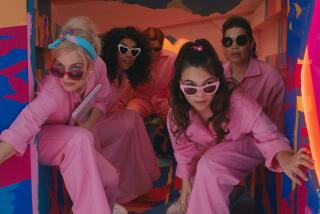‘Black Panther’ and ‘Captain Marvel’ are paving the way for a more inclusive MCU. Is it evolving fast enough?
Higher, further, faster … and, finally, more diverse? Twenty-one films into its juggernaut franchise, Marvel Studios head Kevin Feige says, the company’s recent wave of superhero titles led by global hits “Black Panther” and “Captain Marvel” is only the start of a more inclusive Marvel Cinematic Universe.
“There will be many more announcements to come,” Feige told The Times ahead of the “Captain Marvel” release. “Put it this way: It’s only the beginning.”
Already making good on that promise as the female-fronted “Captain Marvel” crushed the box office in its worldwide debut, Marvel announced last week that Destin Daniel Cretton (“Short Term 12”) will helm the studio’s fast-tracked first Asian superhero installment, “Shang-Chi.” (Casting details are still to come.)
The franchise’s newfound dedication to inclusion, Feige said, owes much to the legacy of the late Stan Lee. The longtime Marvel creative, editor and publisher used his platform to pen his “Stan’s Soapbox” column on a variety of subjects including social and racial injustice.

“Let’s lay it right on the line,” Lee began one oft-quoted 1968 column. “Bigotry and racism are among the deadliest social ills plaguing the world today.” Feige expressed hope that fans will find a spirit kindred to Lee’s social consciousness in the films Marvel is making.
“We’re just the stewards, the current stewards, of these characters that he and his co-creators brought together — and all of them were created in that spirit of those ‘Soapboxes,’” Feige said. “That was very much what Stan’s worldview was, and that’s what these movies represent.
“Because that is — how do I put this — it’s the right way to be. It is the way the world should be. And one of the great things about movies is you get to showcase the world that you want to reflect and the way you want the world to be. And that’s what he did with these characters.”
It’s the right way to be. It is the way the world should be.
— Kevin Feige, Marvel Studios president
Lee died in November at the age of 95 but has remained a constant presence in the MCU and beyond, appearing posthumously in December’s Oscar-winning animated Sony hit “Spider-Man: Into the Spider-Verse.”
A tribute celebrating Lee’s signature Marvel appearances opens the credits lead-in to “Captain Marvel,” in which a scene aboard a speeding train marks one of his final MCU cameos.
Led by Brie Larson, “Captain Marvel” has vanquished both the skeptics and the trolls, a feat to which Lee might have cheered, “Excelsior!” It is the first film in the MCU to be directed by a woman (Anna Boden, who shares directing duties with Ryan Fleck) and scored $455 million globally in its opening weekend, the sixth-biggest launch of all time.
The film powered past $700 million worldwide in its second weekend and is already a lock to crack the MCU’s top 10 global hits; analysts predict it will reach $1 billion in theaters, which would make it only the seventh MCU title to mint 10 figures.
Does Captain Marvel just need to smile more? Nope, says the film’s creative team »
Last year, Ryan Coogler’s “Black Panther” ushered in this new era of the MCU with many firsts: the first Marvel film to center on a black superhero, the first to feature a predominantly black cast, the first to be directed by an African American filmmaker. It made $1.3 billion globally and scored groundbreaking Oscar nominations for the studio, including best picture.
Feige described having similar first conversations with both Larson and Coogler, who wanted to know why Marvel wanted to make their films.
“The initial meetings that we had with [Larson] were not dissimilar to our initial meetings with Ryan Coogler,” he laughed. “‘Oh, wait a minute. They’re interviewing us. We’re not interviewing them.’”
Larson, who brought high-profile social activism to “Captain Marvel” and pushed the studio to grant greater access to diverse journalists in its prerelease press campaigns, had just won her best actress Oscar for “Room.” “She had a lot of choices, and I think she had just won the Academy Award, and she knew the power of what this could be,” Feige said.
“Black Panther,” the trailblazing critical and commercial hit, remains a major feather in Marvel’s cap. Feige earned an Oscar nomination for producing “Black Panther” and said Marvel disregarded the long-prevailing misconception that movies with black stars can’t travel internationally.
Marvel’s Kevin Feige hopes ‘Black Panther’ Oscar nominations empower new voices in Hollywood »
“People would ask, whether it was ‘Captain Marvel’ or more so last year before the release of ‘Black Panther,’ about the risk of an entirely African and African American cast and how it would play around the world,” he said. “And we said, ‘No — we’re just going to try to make a great movie and put it out to the world.’”
The Marvel Cinematic Universe exploded more than a decade ago with 2008’s “Iron Man,” a $585-million global hit starring Robert Downey Jr. Sixteen consecutive franchise installments followed — all led by white men like Thor, Captain America, Ant-Man and Spider-Man — before a superhero of color, Black Panther, would lead a standalone film in the MCU.
“Diversity does make for better movies, especially with a U.S. population that is almost 40 percent minority,” wrote Ana-Christina Ramón, director of research and civic engagement for UCLA’s social sciences division and coauthor of UCLA’s Hollywood Diversity Report, in an email. “People of color are avid moviegoers and want to see themselves represented as heroes on the big screen.”
People of color are avid moviegoers and want to see themselves represented as heroes on the big screen.
— Ana-Christina Ramón, coauthor of UCLA’s Hollywood Diversity Report
“Marvel’s movies since 2008 have been slow to include roles that are more representative and inclusive,” Ramón said. “It’s not enough to just have people of color and women play sidekicks or supporting characters.”
Despite the 10-year wait to see a leading superhero of color in the MCU, Feige insists it was a case of perfect timing: “I wouldn’t have had it any other way because the timing does work; I sometimes joke that Ryan Coogler would still be in high school or elementary school if we tried to hire him to do ‘Black Panther’ early on in the MCU.”
Marvel has also taken a long road with its most prominent female Avenger — Scarlett Johansson’s Black Widow — whom fans have been clamoring to see lead her own film since she first appeared in 2010’s “Iron Man 2.” That film saw movement in July with the hiring of director Cate Shortland.
Last summer also marked the first time a female superhero got title billing in a Marvel film — even if Evangeline Lilly’s Wasp had to share it with a male counterpart — in “Ant-Man and the Wasp.”
Though Feige declined to discuss projects after April’s “Avengers: Endgame,” the studio’s development slate includes “The Eternals,” to be directed by Chloe Zhao (“The Rider”); a sequel to “Black Panther”; and expected sequels for “Doctor Strange” and “Guardians of the Galaxy.”
Even in this moment of celebrated progress, the MCU has miles yet to go. Some, like sociologist and author Nancy Wang Yuen, were disappointed in the limited screen time given to “Crazy Rich Asians” breakout Gemma Chan as Kree warrior Minn-Erva in “Captain Marvel.”
What Disney’s acquisition of Fox could mean for Marvel’s superheroes »
On the “Captain Marvel” red carpet, Marvel exec Victoria Alonso was bullish on LGBTQ representation in the MCU — “The world is ready,” she told Variety — but noncommittal. With the future of the MCU heavily under wraps, rumors that “The Eternals” may include a gay lead character remain purely speculative.
Additionally, Ramón points out that while Marvel has made strides for representation in its comics, groups including Latino and Muslim characters “have had little to no representation in the Marvel Studios film universe.” However, she’s encouraged by the success of “Spider-Man: Into the Spider-Verse,” an animated film outside the MCU, which focused on the black and Latino character of Miles Morales.
“The next step from that animated film is to greenlight a live-action film with Latinx characters that are central to the story line,” Ramón said.
Perhaps Marvel can take a cue from the tagline echoed all over promo materials for its next spandexed bonanza, “Avengers: Endgame”: Whatever it takes.
More to Read
Only good movies
Get the Indie Focus newsletter, Mark Olsen's weekly guide to the world of cinema.
You may occasionally receive promotional content from the Los Angeles Times.











